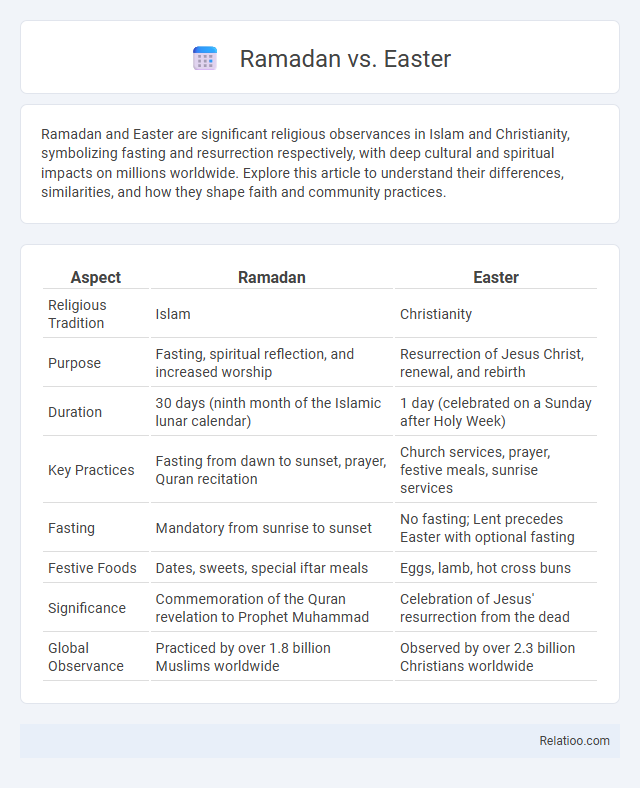Ramadan and Easter are significant religious observances in Islam and Christianity, symbolizing fasting and resurrection respectively, with deep cultural and spiritual impacts on millions worldwide. Explore this article to understand their differences, similarities, and how they shape faith and community practices.
Table of Comparison
| Aspect | Ramadan | Easter |
|---|---|---|
| Religious Tradition | Islam | Christianity |
| Purpose | Fasting, spiritual reflection, and increased worship | Resurrection of Jesus Christ, renewal, and rebirth |
| Duration | 30 days (ninth month of the Islamic lunar calendar) | 1 day (celebrated on a Sunday after Holy Week) |
| Key Practices | Fasting from dawn to sunset, prayer, Quran recitation | Church services, prayer, festive meals, sunrise services |
| Fasting | Mandatory from sunrise to sunset | No fasting; Lent precedes Easter with optional fasting |
| Festive Foods | Dates, sweets, special iftar meals | Eggs, lamb, hot cross buns |
| Significance | Commemoration of the Quran revelation to Prophet Muhammad | Celebration of Jesus' resurrection from the dead |
| Global Observance | Practiced by over 1.8 billion Muslims worldwide | Observed by over 2.3 billion Christians worldwide |
Introduction to Ramadan and Easter
Ramadan is a significant Islamic observance characterized by fasting from dawn to sunset, spiritual reflection, and increased prayer throughout the ninth month of the Islamic lunar calendar. Easter, a central Christian holiday, celebrates the resurrection of Jesus Christ and symbolizes renewal, hope, and salvation, marked by church services and festive gatherings. Both traditions hold deep religious meaning and involve communal participation, yet they differ fundamentally in their historical origins, rituals, and calendrical timing.
Historical Origins of Ramadan and Easter
Ramadan originates from the Islamic calendar, commemorating the month when the Quran was revealed to Prophet Muhammad, making it a period of fasting, prayer, and reflection for Muslims worldwide. Easter traces its roots to early Christianity, celebrating the resurrection of Jesus Christ and symbolizing renewal and hope through various liturgical customs and festive meals. Your understanding of these holidays is enriched by recognizing their deep theological and cultural histories that continue to shape holiday traditions globally.
Core Beliefs and Spiritual Significance
Ramadan centers on fasting from dawn to sunset, emphasizing self-discipline, reflection, and spiritual growth in Islam, while Easter in Christianity celebrates the resurrection of Jesus Christ as a symbol of hope, renewal, and salvation through faith. Holiday traditions vary widely, but both Ramadan and Easter prioritize deep spiritual connection and communal worship, highlighting themes of sacrifice, redemption, and gratitude. Your understanding of these observances can enrich appreciation for their profound roles in fostering faith and cultural identity.
Rituals and Religious Practices
Ramadan involves fasting from dawn to sunset, prayer, Quran recitation, and nightly Taraweeh prayers, emphasizing self-discipline and spiritual reflection in Islam. Easter centers on commemorating the resurrection of Jesus Christ, with rituals such as attending church services, participating in the Easter Vigil, and engaging in the sacrament of communion within Christianity. Your understanding of these holiday traditions highlights distinct religious practices that shape the spiritual experiences and communal gatherings of Muslims and Christians around the world.
Fasting Traditions: Comparison and Meanings
Ramadan fasting involves abstaining from food and drink from dawn to sunset for 29-30 days, symbolizing spiritual reflection, self-discipline, and empathy for the less fortunate in Islam. Easter fasting traditions, such as Lent, include giving up certain foods or habits for 40 days to commemorate Jesus Christ's sacrifice and prepare for resurrection celebrations in Christianity. Your participation in these fasting customs connects you to deep spiritual meanings and cultural histories, highlighting themes of purification, sacrifice, and renewal across diverse religious holidays.
Community Gatherings and Social Impact
Ramadan, Easter, and various holiday traditions each foster strong community gatherings that enhance social bonds and cultural identity. During Ramadan, communal iftars unite families and neighbors in shared reflection and charity, while Easter often involves church services and family meals that reinforce faith and togetherness. Your participation in these events contributes to social cohesion, promoting empathy, support networks, and collective celebration across diverse communities.
Symbolic Foods and Culinary Customs
Ramadan features fasting from dawn to sunset and iftar meals often include dates and water to break the fast, symbolizing purification and renewal. Easter traditions emphasize foods like lamb, symbolizing sacrifice, and eggs, representing rebirth and fertility, typically enjoyed during festive family meals. Holiday culinary customs vary widely but often include symbolic dishes such as sweet breads, roasted meats, and seasonal fruits reflecting cultural heritage and community celebration.
Dates and Lunar Calendar Influence
Ramadan is observed based on the Islamic lunar calendar, beginning with the sighting of the new moon, causing its dates to shift approximately 10 to 11 days earlier each solar year, while Easter follows the Gregorian calendar but is determined by the lunar cycle as it falls on the first Sunday after the first full moon following the vernal equinox. Holiday traditions for both Ramadan and Easter are deeply rooted in religious observances that align with these lunar or solar-lunar calculations. The fluctuating dates highlight the influence of lunar phases in religious festivities, contrasting with fixed-date holidays that adhere strictly to the solar Gregorian calendar.
Modern Celebrations Around the World
Ramadan, Easter, and various holiday traditions showcase unique modern celebrations worldwide, blending religious rituals with contemporary customs. Ramadan features global lantern festivals and communal iftars that emphasize unity and charity, while Easter incorporates vibrant egg hunts, parades, and chocolate gifting that symbolize renewal and joy. Holiday traditions in different cultures highlight diverse expressions of family gatherings, festive meals, and public events, reflecting the fusion of ancient beliefs with modern social practices.
Interfaith Reflections and Shared Values
Ramadan, Easter, and various holiday traditions each embody core values of reflection, renewal, and generosity that transcend religious boundaries. Your observance can highlight the shared emphasis on community, forgiveness, and spiritual growth present across Islam, Christianity, and other faiths. Recognizing these commonalities fosters interfaith understanding and strengthens the bonds between diverse cultural celebrations.

Infographic: Ramadan vs Easter
 relatioo.com
relatioo.com